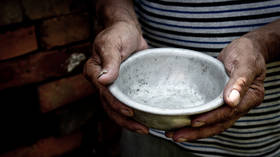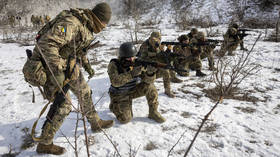‘You don’t have AIDS’: RT documentary takes on Russia’s top HIV denialist (VIDEO)
The spread of HIV/AIDS in Russia is often called an epidemic, but the fight against the disease has a peculiar enemy: denialists who say it's all a hoax. They aren't just bloggers and celebrities, but influential medics too.
The human immunodeficiency virus was first discovered in 1983 in the US and France. As newspaper headlines announced the grim discovery, the denialists soon followed. Almost four decades have passed since, but they’re still going strong in Russia and abroad.
“HIV/AIDS was a major thing that drew global attention… and people tried to find a conspiracy behind all that – much the same way that some people believe that the US Moon landing was a hoax, and the fake footage was produced in Hollywood,” Anton Krasovsky, an HIV-positive journalist, said in ‘Epidemic’, a new documentary he shot for RTD.
Also on rt.com 3rd patient reportedly cured of HIV in incredible medical breakthroughThere are around one million people living with HIV in Russia, with 86 thousand learning of their illness in 2018. Though 2018’s figures represented a slight decrease compared to previous years, scientists and experts still refer to the situation as an “epidemic.”
In Episode 1, Krasovsky and his film crew made a journey to Irkutsk Region, where more than 1.6 percent of the population are infected. Despite the region’s state of ‘generalized epidemic’, Irkutsk is home to one of the country’s most vocal HIV deniers, former pathologist Vladimir Ageev.
Ageev, who headed the pathology department at the local medical university, has written a number of books and made several TV appearances, insisting that HIV is “all lies” invented by pharmaceutical corporations in order to gain profit.
“I’m telling you, you aren’t infected, you aren’t sick,” Ageev assured Krasovsky when the journalist opened up about his condition. Dismissing the mountains of scientific research confirming the existence of HIV/AIDS, Ageev called the research “manipulated,” doctors “basically Nazis,” and claimed that the Nobel Prize given to the European scientists who discovered the virus was awarded by “crooks.”
Meeting with Krasovsky in a darkened pool hall, Ageev was quick to anger when pressed on his denialism, and insisted that the journalist’s sickness had another cause. “You are just hiding something,” he thundered when Krasovsky told him he had an otherwise clean bill of health when his HIV was diagnosed.
“I am working as a therapist. People call me, come to talk to me from all over… and they’re all alive,” the former pathologist continued, adding that lethal cases of HIV/AIDS are not caused by the disease, but by conventional treatments for it.
The actions of Ageev and other deniers with medical diplomas are “a real problem,” Yulia Plotnikova, chief doctor of the Irkutsk AIDS center, said.
“It’s an obstruction that can derail all our efforts in working with patients. We’ve seen so many tragedies, like a child’s death, or a woman’s death,” she said, adding that it is sometimes almost impossible to persuade people to start treatment. Compounding her frustration, Plotnikova has seen her own, educated colleagues embrace denialism.
“It’s so much worse when HIV/AIDS denialism is popular among medical professionals,” she said. “If medical university professors say that HIV doesn’t exist, their voices will be heard.”
Krasovsky, who is the head of the AIDS Center Foundation, also chatted with former HIV denialist, Maria Petrova, who has now completely abandoned her old beliefs. Standing at the cemetery where her husband is buried, Petrova is reminded every day of the consequences of dismissing the disease.
Petrova’s late husband, a drug addict, refused treatment. When Petrova caught the disease from her husband, she initially opted not to seek medical help, taking his word that HIV was “a massive fraud of the 21st Century.”
“He just thought it was a hoax and he didn’t have any disease,” she said. “He just ruined me. He destroyed my life. I have no family. I have nothing; I’m afraid to build anything.”
Watch the full episode here:
Think your friends would be interested? Share this story!














